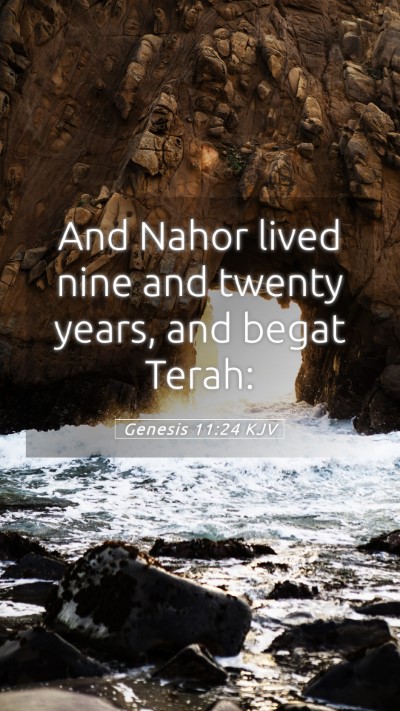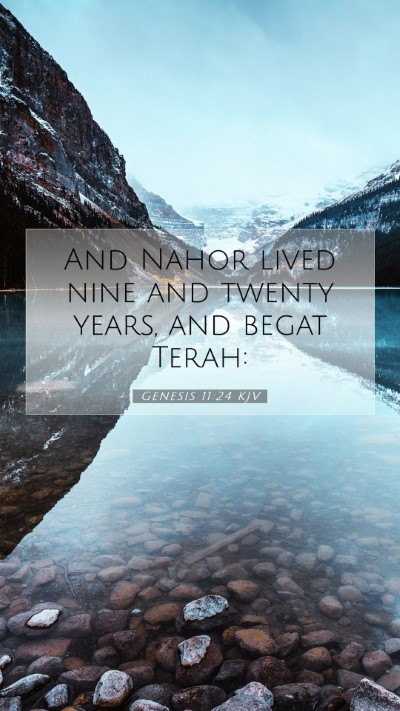Understanding Genesis 11:24
Genesis 11:24 states, "And Nahor lived nine and twenty years, and begat Terah." This verse is situated within the genealogical account leading to the patriarch Abraham. Analyzing this verse involves examining its historical context and its significance in the broader narrative of Genesis.
Bible Verse Meaning
The verse presents a simple fact about the lineage of Abraham. It introduces Nahor, one of the ancestors in this genealogy, and marks a specific moment in time when he became a father. Each numeric detail in biblical genealogy often carries significance, not just in literal terms, but also in the legacy passed through generations.
Bible Verse Interpretations
-
Matthew Henry's Commentary: Matthew Henry emphasizes the importance of genealogies in Scripture, noting that they serve not only as historical records but also as markers of God's providence in human history. The birth of Terah from Nahor is crucial as it sets the stage for the narrative of Abraham, whom God would choose to begin His covenant with humanity.
-
Albert Barnes' Notes: Barnes highlights the significance of Terah's birth. He discusses how this genealogy demonstrates the continuity of God's promises through generations, ultimately leading to the nation of Israel. This verse is not just a record of ancestry, but signifies the unfolding plan of God for His people.
-
Adam Clarke's Commentary: Clarke offers insights into the cultural practices of the time and suggests that the age at which Nahor became a father was typical for that era. He discusses how the genealogical records serve to establish legitimacy and divine purpose throughout the scriptures.
Bible Verse Understanding
To gain a deeper understanding of this verse, it is essential to recognize its place in the narrative of Genesis. The genealogies often underscore God’s design in the unfolding story of redemption. Each name mentioned is a reminder of God’s faithfulness across generations, and the age of Nahor when he fathered Terah signifies the continuation of a divine lineage.
Key Themes
- Legacy: The verse illustrates the theme of legacy in the biblical narrative, showing how each generation contributes to the unfolding plan of God.
- Divine Providence: This verse fits within the larger framework of God's providential care and selection of individuals to fulfill His will.
- Historical Context: Understanding the historical context of Genesis during the time of Nahor provides insight into the socio-cultural dynamics of family and lineage in ancient times.
Application of Genesis 11:24
In applying Genesis 11:24 to daily life, one can reflect on the significance of family history and the impact of one generation on another. This verse invites readers to consider how their legacies are formed and how they might influence future generations.
Bible Verse Commentary
Reflecting on the comments from various scholars enhances our understanding of this passage. The genealogical accounts, like that of Nahor, serve to remind us that every individual plays a part in the grand tapestry of God's story. The narrative leading to Abraham marks a pivotal point in biblical history, establishing a covenant community.
Related Bible Verses
- Genesis 11:26: "And Terah lived seventy years, and begat Abram, Nahor, and Haran."
- Genesis 12:1: "Now the Lord had said unto Abram, Get thee out of thy country."
- Hebrews 11:8: "By faith Abraham, when he was called to go out into a place which he should after receive for an inheritance, obeyed; and he went out, not knowing whither he went."
In-Depth Analysis
Each name and age in genealogies serves to provide a historical backdrop that reinforces the theological statements within scripture. Genesis 11:24, while seemingly straightforward, is deeply embedded in the narrative that highlights God's intentionality in creating a chosen people through which He would accomplish His purposes.
Studying Bible verse meanings, interpretations, and understandings requires careful examination of context, language, and theological implications. Engaging with such verses provides insights that are applicable to personal faith journeys and enriches comprehension of the scriptures.
Conclusion
Genesis 11:24 serves as more than a mere genealogical entry; it connects generations and highlights the significance of family in God's design. The exploration of verse meanings through public domain commentaries illuminates its context and provides scholars and casual readers alike with a deeper understanding of Scripture.


